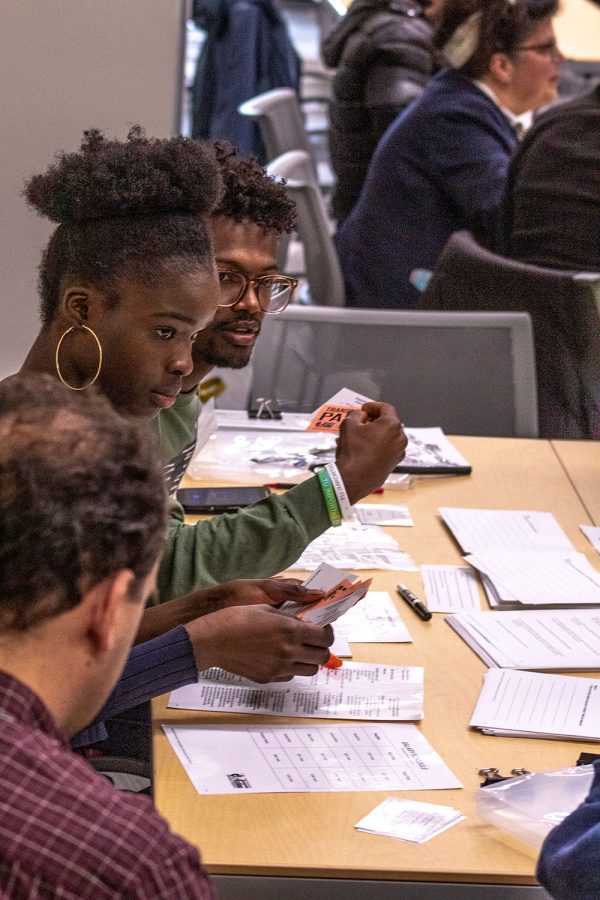Impactful lesson about poverty
“We are trying to teach people about poverty and what it is like to live in poverty. The easy answer is to say ‘you’re having trouble, get a job’ and this really demonstrates that that just isn’t true.” – Lucia Nunez, Vice President for Equity, Inclusion and Community Engagement
Students help run a station at the poverty simulation activity held this month at the Truax Campus. The event was run by the Office of Equity, Inclusion and Community Engagement.
Madison College ensures all of its students feel equal and understood. Among this effort, Lucia Nunez, Vice President for Equity, Inclusion and Community Engagement partnered with United Way to provide a poverty simulation to students and faculty.
Not only could staff and students participate, but volunteer opportunities were also made available to help with the simulation. Whether volunteer or participant, there was something to be learned.
After the participants arrived, they were assigned to families, having to communicate and cooperate to survive the poverty their family was about to experience. The families went through 15-minute intervals that represented a week for the family.
The parents had to go to work while the children went to school. Every time they “left their house”, they had to have a “transport ticket.” These were hard to obtain and the families needed one every time they travelled somewhere new.
These families had to attend work and pay all of their bills, while making sure no one in the family starved. Most resources that would usually be available to the families were closed on the “weekend”, forcing them to have to make arrangements to complete the tasks during the week days. This simulation was made to be nearly impossible by demonstrating families living pay check to pay check, week to week.
Volunteers arrived early to receive a briefing on what their role was in this simulation. They each got to pick a “resource” or place to work at. The volunteers were told to be as harsh or as understanding as they want, because, in reality, people aren’t always understanding. Observing the school, two volunteers acted as teachers. They were harsh and created a hostile environment for the children. This was very real and, in turn, put the participants at school in a bad mood, effecting the rest of the week for the families.
The volunteers got an insight to what possible resources, such as social services, homeless shelter, and juvenile halls were like. They also got to see what the different participants were struggling with, creating a real look into the life of poverty.
“We are trying to teach people about poverty and what it is like to live in poverty. The easy answer is to say ‘you’re having trouble, get a job’ and this really demonstrates that that just isn’t true,” said Nunez.
Not only does this effect millions of Americans every day, it also effects students we go to school with every day.
Julie Nelson works for United Way as the Community Engagement Coordinator and was the one who came into contact with Nunez. Both Nelson and Nunez stressed how important it is that not only other students, but faculty as well understand the hardships of poverty that is a reality for many students.
“Poverty affects students’ success and affects so many different portions (of life),” said Nunez.
Something as simple as just getting to the school for class can affect student achievement, or something as complicated as not having enough time to study and finish homework because they work unimaginable hours, with one or even multiple jobs.
This simulation allowed for the participants to empathize on a deeper level when it comes to poverty, especially pertaining to the student population.



























